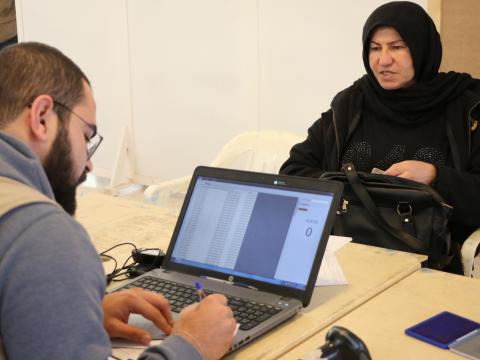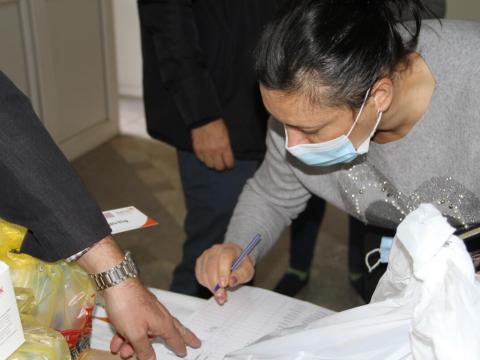
Beneficiary data: It’s time we grew up and learned to trust
Amos Doornbos says there is an answer to the aid data muddle.
When the aid industry began shifting to digital, we all grasped for the shiny new toys like over-excited children. Now, we find ourselves with a confusion of gadgets, systems and data that do not ‘talk’ to each other. We became fascinated with digital devices, but forgot (or refused) to do the hard work of agreeing standards or governance. We even overlooked the basics of beneficiary literacy, which is fundamental to using the systems. And so we find ourselves stuck in a mess of our own making, squabbling over who controls the data.
Thankfully cash and voucher programming is coming to our rescue. In non-cash programming, we set up consortiums that allowed us to operate in our traditional siloed way. We organised ourselves either by geography or by sector thereby ensuring we didn’t need to share data with anyone but the prime agency. Cash programming is forcing us to think again because other agencies, and even private sector entities, perform a range of functions across cash programme implementation. While one agency registers the community members, another distributes the cash, and another does the accountability and monitoring; so we have no choice but to share data.
But again, like children, individual agencies do not entirely trust anyone outside our immediate family, nor do we trust their ways of doing things. A lack of universal standards around data security, around data collection, around beneficiary registration, means we can all say “our way is better than yours!” Those of us with digital data collection systems risk acting like playground bullies forcing our approach on others.
Time to grow up
It is time stop grasping for power and control. It’s time to look beyond our individual interests and work together. Airlines fiercely compete for passengers while also seamlessly sharing passenger data. They do this through a separate not-for-profit organisation that all the airlines jointly own and rotate the chairperson each year. While no one airline ‘owns’ the data, they all ‘own’ it together.
In the world of digital identity, organisations, foundations, and companies have spent years trying to solve the challenge of how you prove the person on the Internet is who they say they are. Decentralised digital identity was born and given life by organisations like the Sovrin Foundation, uPort, SelfKey, and Tim Berners-Lee’s Solid Server project. Now there are countless start-ups working in this space. They all recognise how central an individual’s data is to service delivery. They also understand that individuals should own and control who has access to data about them. Mass adoption of this technology is years off yet, but it will happen given time.
And it’s not just companies looking at this, the Canadian government has been working on this for years as well. Their Pan-Canadian Trust Framework is one of the leading thought pieces globally. It outlines how Canadian citizens can access countless government services without needing to share personal data with each service.
Beyond an individual organisation or individual person owning and controlling data lies the collective; the commons. Woven within the fabric of humanitarian agencies is the belief of the value of the community. Our work often is with communities, not just focusing only on individuals. There is a fundamental belief that the sum of the parts is greater than the whole. And this belief should also be part of the approach to managing and protecting data.
Time to trust
Learning from outside our sector, we can create a future in which the data about the people we seek to serve is kept within a data trust. A trust is an entity created to hold assets for the benefit of certain persons or entities, with a trustee managing the trust. In the humanitarian application, the trustees of the data trust can include representatives from the community whose data it is.
This is slightly different to the airline approach because it is using a different, more lightweight legal vehicle. A trust has distinct, clear, and detailed rules about what data it holds, who has access to it, and how the data can be used. It is managed collectively. It sets the rules and standards collectively. It works with legacy and cutting-edge systems.
As children can inherit financial trusts when they come of age, so too we aid industry need to mature. Yes we all dislike monopolies and are distrustful of global registries of our or vulnerable people’s data. But no one agency on its own has the answer to protecting or managing data. We have to work together. Indeed as this publication recently warned, the very people we work to protect are at risk if are inter-agency cooperation continues to be poor and the data we have gathered unsecure. Lives could even be put at risk.
Data Trusts give us an equitable, workable solution. What’s more they help us resolve the data governance challenge freeing us up to set standards and get on with the work we are called to do. At World Vision we’re already talking to our partners in the Collaborative Cash Delivery Network and the Cash Learning Platform about how we can make trusts work. Please get in touch if you also want be part of the next phase of data sharing and data protection.
Amos Doornbos is World Vision's Director of Strategy and Systems, Disaster Management Team.

